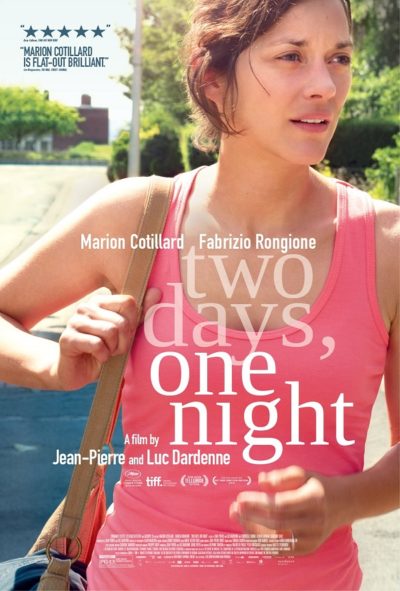
An Oscar win can catapult actors to world stardom. Marion Cotillard’s surprise win in La Vie En Rose helped her gain supporting parts in a string of significant and/or successful films such as Inception, Contagion, and The Dark Knight Rises – but not a major starring role in a Hollywood hit. Her brilliant lead performance in Two Days One Night is certainly winning her more plaudits, with surely awards to follow, but I think her future will remain as a notable star on the art house circuit.
She plays Sandra, a solar panel factory worker who is about to return to work after a period of depression. In her absence, her co-workers have worked harder and longer to cover for her, and have maintained productivity as a result. The company boss, using the faltering economic conditions as an excuse, offers them a choice. Either Sandra returns, or she is laid off and all of the other workers receive a 1,000 Euro bonus. The decision is to be made by a secret ballot of all of the workers on the Monday Sandra is due to return. Sandra has the weekend before that to try to persuade her colleagues to vote for her to stay.
It is to the credit of the writer/directors Jean-Pierre and Luc Dardenne that Sandra is not presented as a saint, and the choice to be made is not a straightforward one. Many of the workers are struggling with money issues and have families dependent on their potential bonus. Additionally, Sandra can be irritating and you can imagine how her mood swings might make her hard to work with. Despite her character flaws however, Cotillard’s excellent performance should have you rooting for her as she tries to plead her case over the fateful weekend. Most of the other workers only appear briefly but are well rounded characters, and amongst the inexperienced cast there are notable performances by Catherine Salée and Christelle Cornil.
The story unfolds in some unexpected ways with workers and seemingly friends getting involved in a fist fight, another breaking down in tears of guilt, and a woman finding the courage to defy and then leave her husband. This is timely slice of social realism from the Dardenne brothers powered by Cotillard’s career best performance. So what causes the film to be ‘only’ an 8 out of 10 effort? Well, some of the scenes showing Sandra explaining her predicament to her colleagues become a little repetitive and Sandra’s depression, with her reliance of Xanex, adds an unnecessary melodramatic note.
It will, though, live long in the memory.
Rating: 8 out of 10